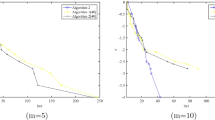Abstract
The auxiliary problem principle has been proposed by the first author as a framework to describe and analyze iterative algorithms such as gradient as well as decomposition/coordination algorithms for optimization problems (Refs. 1–3) and variational inequalities (Ref. 4). The key assumption to prove the global and strong convergence of such algorithms, as well as of most of the other algorithms proposed in the literature, is the strong monotony of the operator involved in the variational inequalities. In this paper, we consider variational inequalities defined over a product of spaces and we introduce a new property of strong nested monotony, which is weaker than the ordinary overall strong monotony generally assumed. In some sense, this new concept seems to be a minimal requirement to insure convergence of the algorithms alluded to above. A convergence theorem based on this weaker assumption is given. Application of this result to the computation of Nash equilibria can be found in another paper (Ref. 5).
Similar content being viewed by others
References
Cohen, G.,Optimization by Decomposition and Coordination: A Unified Approach, IEEE Transactions on Automatic Control, Vol. AC-23, No. 2, pp. 222–232, 1978.
Cohen, G.,Auxiliary Problem Principle and Decomposition of Optimization Problems, Journal of Optimization Theory and Applications, Vol. 32, No. 3, pp. 277–305, 1980.
Cohen, G., andZhu, D. L.,Decomposition Coordination Methods in Large-Scale Optimization Problems: The Nondifferentiable Case and the Use of Augmented Lagrangians, Advances in Large-Scale Systems, Theory and Applications, Edited by J. B. Cruz, JAI Press, Greenwich, Connecticut, Vol. 1, pp. 203–266, 1984.
Cohen, G.,Auxiliary Problem Principle Extended to Variational Inequalities, Journal of Optimization Theory and Applications, Vol. 59, No. 2, pp. 325–333, 1988.
Cohen, G.,Nash Equilibria: Gradient and Decomposition Algorithms, Large Scale Systems, Vol. 12, pp. 173–184, 1987.
Ekeland, I., andTemam R.,Convex Analysis and Variational Problems, North-Holland, Amsterdam, The Netherlands, 1976.
Aubin, J. P., andEkeland, I.,Applied Nonlinear Analysis, John Wiley and Sons, New York, New York, 1984.
Pang, J. S.,Asymmetrical Variational Inequality Problems Over Product Sets: Applications and Iterative Methods, Mathematical Programming, Vol. 31, No. 2, pp. 206–219, 1985.
Pang, J. S., andChan, D.,Iterative Methods for Variational and Complementarity Problems, Mathematical Programming, Vol. 24, No. 3, pp. 284–313, 1982.
Glowinski, R., Lions, J. L., andTremolieres, R.,Analyse Numérique des Inéquations Variationnelles, Tome 1: Théorie Générale, Premières Applications, Dunod, Paris, France, 1976.
Author information
Authors and Affiliations
Additional information
Communicated by D. Q. Mayne
This research has been supported by the Centre National de la Recherche Scientifique (ATP Complex Technological Systems) and by the Centre National d'Etudes des Télécommunications (Contract 83.5B.034.PAA).
Rights and permissions
About this article
Cite this article
Cohen, G., Chaplais, F. Nested monotony for variational inequalities over product of spaces and convergence of iterative algorithms. J Optim Theory Appl 59, 369–390 (1988). https://doi.org/10.1007/BF00940305
Issue Date:
DOI: https://doi.org/10.1007/BF00940305



